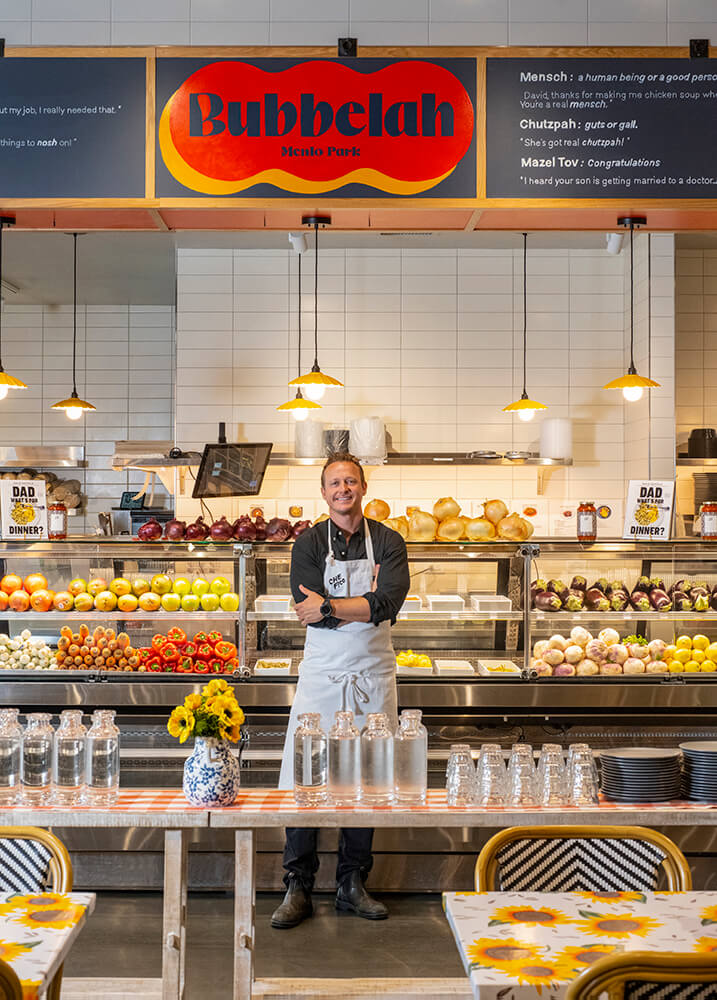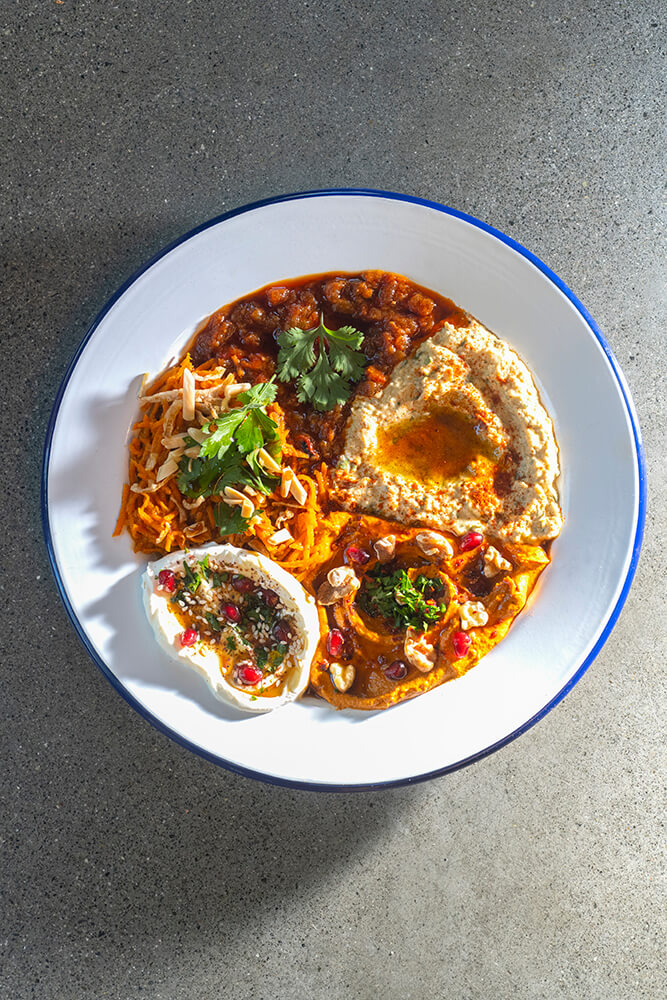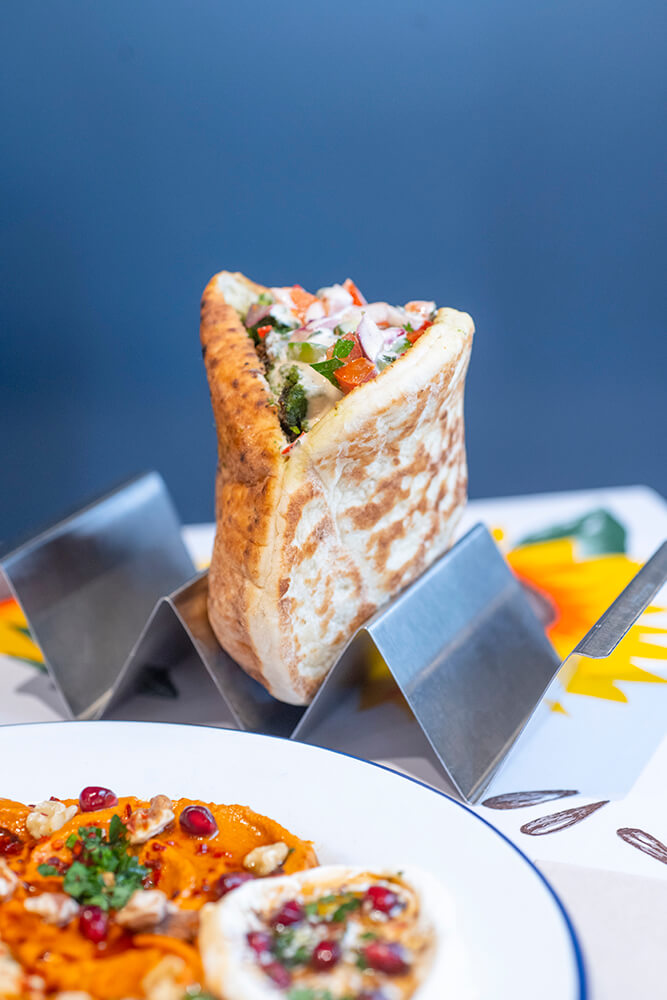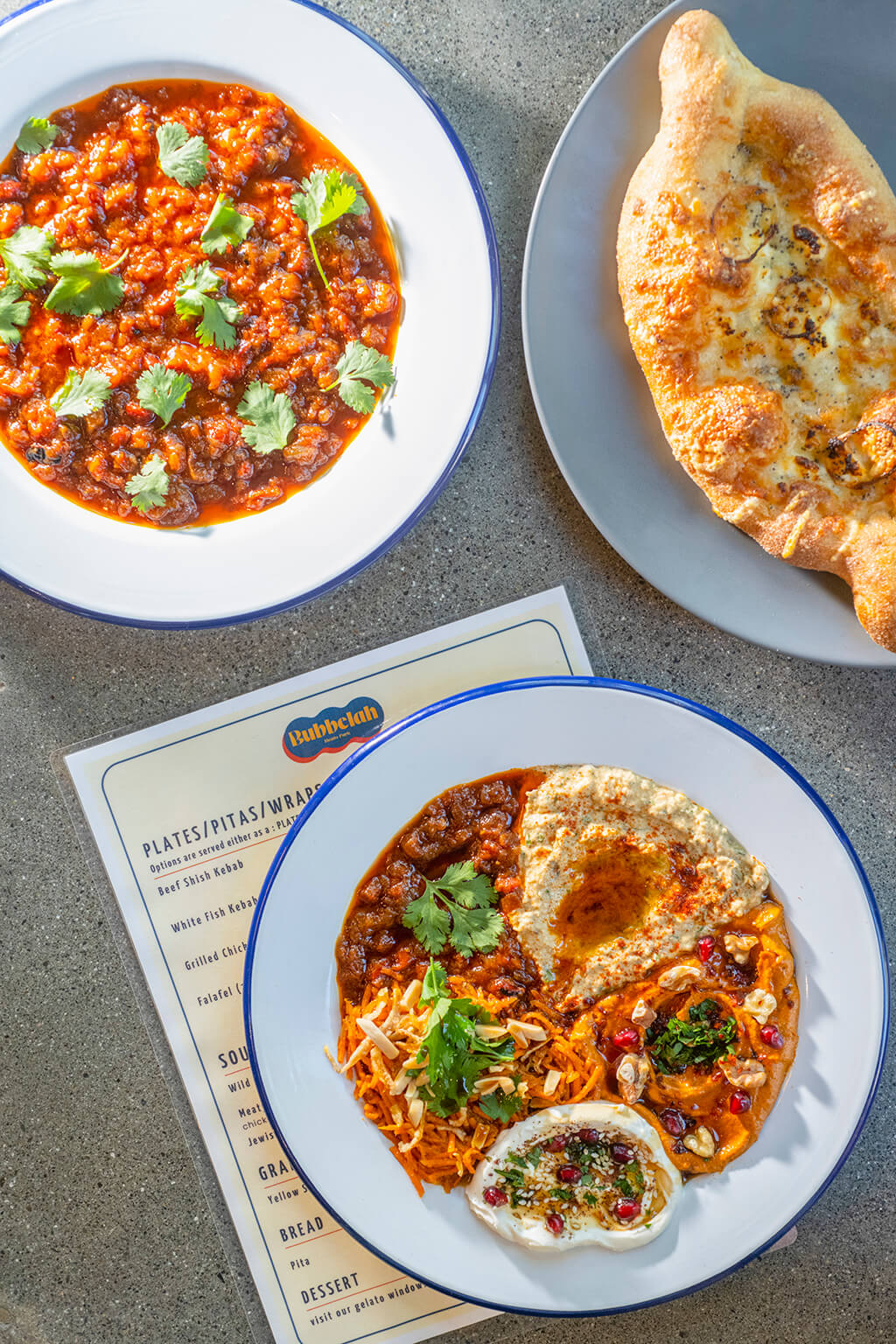Words by Sharon McDonnell
Mango and pomegranate might not be the first ingredients that come to mind when you think of Jewish food, but you’ll find them on the menu at Bubbelah, a new eatery in Menlo Park offering a tasty education in this wide-ranging cuisine.
Known for his Italian restaurants, Che Fico in San Francisco and its Peninsula outpost Che Fico Parco Menlo, chef and co-owner David Nayfeld’s Bubbelah is a return to his roots as the son of Jewish immigrants from Belarus, a former Soviet republic. “The world of Jewish food is vast, due to the diaspora and migration to so many countries,” David says. “I love the flavors, which are bold and beautiful, and want to share that Jewish food is so much more than matzoh ball soup, latkes and brisket.”
Bubbelah (an affectionate word that means “darling” in Yiddish) is a casual dining restaurant with a cheerful ambience and sunflower-design tabletops. It replaced the short-lived Mercato di Che Fico in Springline, the luxury live-work complex whose many restaurants are a beacon for foodies on the Midpeninsula. After a quick makeover, the reborn space opened as Bubbelah in June.

Many of the eatery’s dishes are Sephardic or Mizrahi, which might be less familiar than the Eastern European food associated with Jewish delis. On the menu you’ll find amba, an Iraqi-Jewish sauce composed of pickled fermented mangoes, that pairs well with David’s fried potatoes, which also come with feta cheese, tahina, chiles and Aleppo pepper. The falafel, deep-fried chickpea balls, have bright-green centers revealing abundant parsley, mint and cilantro. Arayes is a Lebanese pita sandwich stuffed with ground beef and served with yogurt sauce and schug, a garlicky and herbaceous Yemenite condiment.
I found pomegranate arils in several of my dishes: muhammara, a walnut-red bell pepper spread; the spiced carrots with harissa, almonds and shallots; labneh, a strained yogurt topped with toasted sesame seeds and sumac; matbucha, a North African spiced tomato salad with red bell peppers; and an apple-cabbage salad dressed in a cumin vinaigrette.
Bubbelah isn’t David’s first foray into serving Jewish cuisine. He introduced some Roman-Jewish specialties at his Italian restaurants, like crispy-fried artichokes and suppli, deep-fried balls of rice, cheese and tomato akin to arancini. But Bubbelah is a personal project that excites him. “I wanted something near and dear to my heart,” he says. In 2016, before opening Che Fico, and after working as the senior sous chef at three-Michelin-star Eleven Madison Park in New York City, David launched a Russian food pop-up called Mama Galina in San Francisco’s Mission District.

Bubbelah’s menu roams the globe, from khachapuri, a dish from the former Soviet republic of Georgia, to kebabs of beef, chicken and fish. But David’s khachapuri, a boat-shaped bread that usually has melted cheese and a runny egg in the middle, features feta, mozzarella, spring onions and poppy seeds instead. “This combo made sense to me,” he notes. “I wanted feta for the zing and brininess, mozzarella for the meltiness and the poppy seeds reminded me of New York bialys. I like to make something my own.” His kebabs, made of meat or white fish like cod or rockfish, aren’t served on skewers. Instead, they’re tucked inside pita or lavash wraps that contain hummus, tahina, pickled turnip, shredded cabbage, garlic sauce, amba and schug (often spelled zhoug), a spicy sauce made from serrano peppers, cilantro and garlic. Kebabs are also served as rice plates.
“Those foods were very present in my childhood. Both my brother and I were latchkey kids because our parents worked and started their own businesses,” David explains. To help out, the family had live-in help from a series of Soviet women who hailed from Georgia, Uzbekistan and Ukraine. Russian meat kebabs are very different from Middle Eastern and Turkish kebabs, David notes. The Russian variety, called shashlik, are marinated meat cubes grilled over hot coals, while the latter are meats that can also be shaved from a vertical spit. Sturgeon is also used in Russian and Armenian kebabs.

Bubbelah’s mezze plate omits the ubiquitous hummus, and is a riot of color that features muhammara, labneh, matbucha, carrot salad and baba ganoush. Three of David’s favorite dishes are his matzoh ball soup, khachapuri and falafel, where “we developed the recipe ourselves.” His matzoh ball soup contains generous portions of shredded chicken and diced carrots in the broth, with the surprising addition of ground chicken in the matzoh meal for a boost of extra nutrition.
“As I get older, I’m more conscientious about my health. Last Passover, I wanted to make matzoh balls for my daughter but wanted her to get more protein, so I added chicken. It has a much more silky texture and is almost like a chicken dumpling,” says David, who recently penned the cookbook Dad, What’s for Dinner? It contains over 80 “unfussy” recipes from ravioli to lasagna, focusing on simple and yummy foods that encourage kids to become more adventurous eaters.
Despite his sterling pedigree—which includes being a semifinalist for the 2023 James Beard Foundation’s Outstanding Chef Award and a stint at Joel Robuchon’s The Mansion at MGM Grand in Las Vegas—David’s also a fan of more rustic fare and exudes enthusiasm over Bubbelah. “The food is great for lunch or dinner and is highly deliverable,” he promises. Expect new offerings like sabich sandwiches and dishes for the Jewish holidays.


